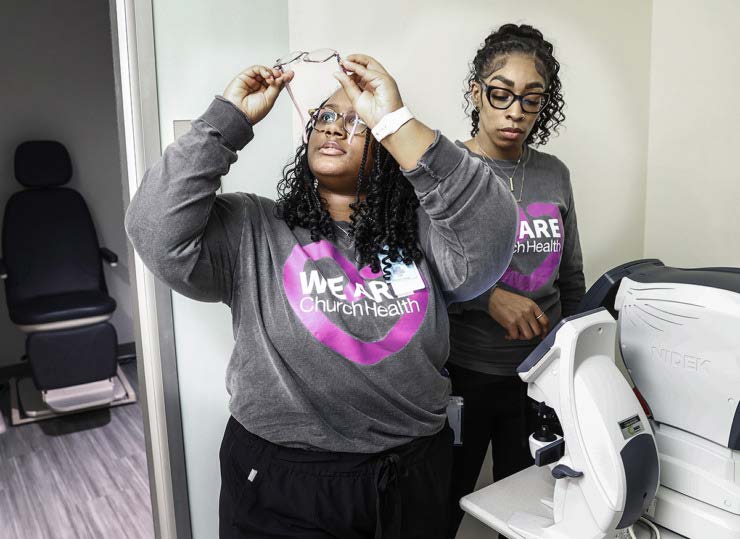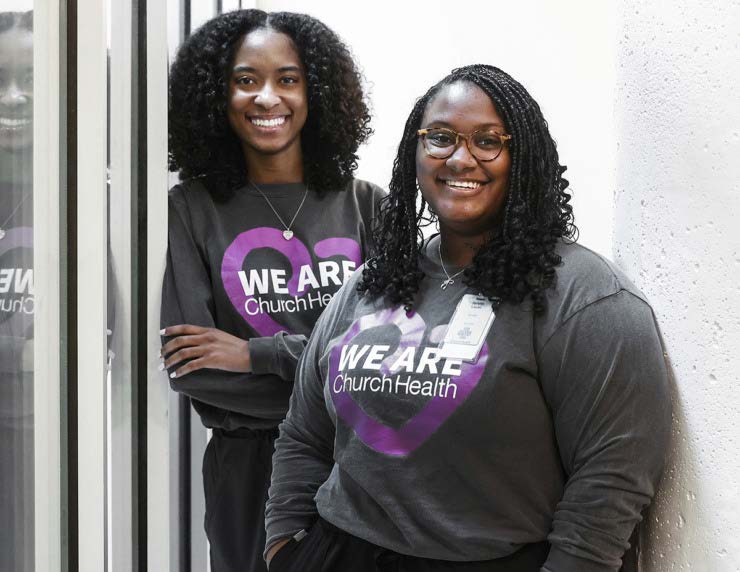Church Health has been making health care accessible for uninsured and underinsured patients for 37 years, and it’s been training doctors from underrepresented backgrounds for almost as long.
Church Health Scholars was founded in 1990 as a gap-year program to bridge the gap between undergraduate education and medical school.
“We’re trying to bridge that gap between undergraduate and moving into professional school so they have some sort of landing pad to get them to that next phase,” said Shelby Pointdexter, the nonprofit’s culture and employee-experience coordinator who manages the program.
“Church Health — the nation’s largest faith-based, privately funded health clinic — takes recent college graduates into its vast fold for one year, allowing them to explore health careers, gain clinical experience and build their networks.
Heaven Newson is working in Church Health’s optometry clinic this year. The Memphis native graduated from Vanderbilt University in May with a degree in medicine, health and society.
“Doing small things for patients, like scheduling or dilating them — it’s building that foundation and increasing my comfortability with patient interactions,” she said.
Scholars work in full-time roles that offer the same benefits — including medical coverage, a 401(k) and professional-development opportunities — available to full-time employees of Church Health. The program’s structure allows scholars to gain experience without struggling with financial burdens.
“I feel like the responsibility is very big, but I feel supported,” said Newson, who’s one of 16 scholars in the current cohort.

Their hometowns include Memphis, Arlington, Bartlett, Collierville, Cordova, Nashville, Horn Lake and Windermere, Florida.
They work in service areas that include behavioral health, dental, medical, nutrition, optometry, physical rehabilitation and youth health prevention and wellness.
Among their undergraduate alma maters are Columbia University, Fisk University, LeMoyne-Owen College, Rhodes College, Rust College, the University of Memphis, the University of Tennessee at Knoxville and Vanderbilt.
“The majority of scholars that apply are interested in medical school, dental school, optometry or physical therapy,” Pointdexter said. “We have some who are interested in physician assistant school. But all of them are interested in matriculating into some sort of health care leadership role.”
However, the medical-school path can be difficult to navigate for students from underserved backgrounds who don’t have friends or family members in the field.

“A lot of med-school applicants go straight from undergrad into med school because they have the resources and networking ability to do that,” Pointdexter said. “Our first-generation students just don’t have those networking connections, so we get them connected to the right people.”
Scholars also receive about 1,500 hours of hands-on clinical training, which gives them an advantage when applying to professional colleges. And they receive help with the arduous application process, including academic support, mock interviews and writing assistance.
“We actually just finished doing a mock-interview prep with one scholar,” said Pointdexter, a former English teacher whose writing acumen comes in handy. “She has two interviews coming up next week, so it kind of comes in waves. And we support them with whatever they need.”
Scholars have gone on to study medicine at institutions like the University of Tennessee Health Science Center, Meharry Medical College, Philadelphia’s Temple University and Baptist Health Sciences University’s new College of Osteopathic Medicine.
“We actually have five of our alumni in their inaugural class, so we’re really excited that they get to be on the ground at something exciting happening at Baptist,” Pointdexter said. “We do like to kind of keep them in Memphis and try to build up our city as well.”
Many scholars who’ve graduated from professional schools have chosen to practice in Memphis, creating more diversity in local health care providers and a strong network of mentors for incoming scholars.
But not all scholars go on to professional schools because some find their calling through the program in areas such as public health and patient services. “We make sure that we’re developing leaders in different areas, like the social determinants of health,” Pointdexter said. “Our hope is that we can affect change through many different avenues.”
Fernando Salazar from the 2017 cohort now works with the Church Health’s patient-assistance program. His colleague Rachel Depperschmidt was the nonprofit’s director of population health and quality improvement until her recent move to the West Cancer Center.
Newson said she hopes to remain in Memphis to support the community’s myriad health care needs and the mission of Church Health. “The Memphis community needs people who actively care about the role health care plays,” she said. “Knowing there are people here who truly live by that mission through morals and through practice in medicine is really important to me.”
Read the full story on Daily Memphian.
Aisling Mäki has spent the better part of two decades writing about Memphis. A former digital journalist for WMC Action News 5 and staff reporter for Memphis Daily News, her work has also appeared in The Commercial Appeal, High Ground News, I Love Memphis, Inside Memphis Business, The Memphis Flyer, Memphis Parent, Memphis Magazine and Tri-State Defender.
The Daily Memphian is the must-read, primary daily online publication for intelligent, in-depth journalism in the Memphis community. The Daily Memphian reports on critical news, holds political, business and community leaders accountable, and engages with and entertains its readers – all while seeking truth, acting with integrity, and never fearing stories simply because of their negative or positive attributes. Led by a seasoned team of veteran journalists, The Daily Memphian is of Memphis, not just in Memphis, and seeks to tell the stories of this city.
